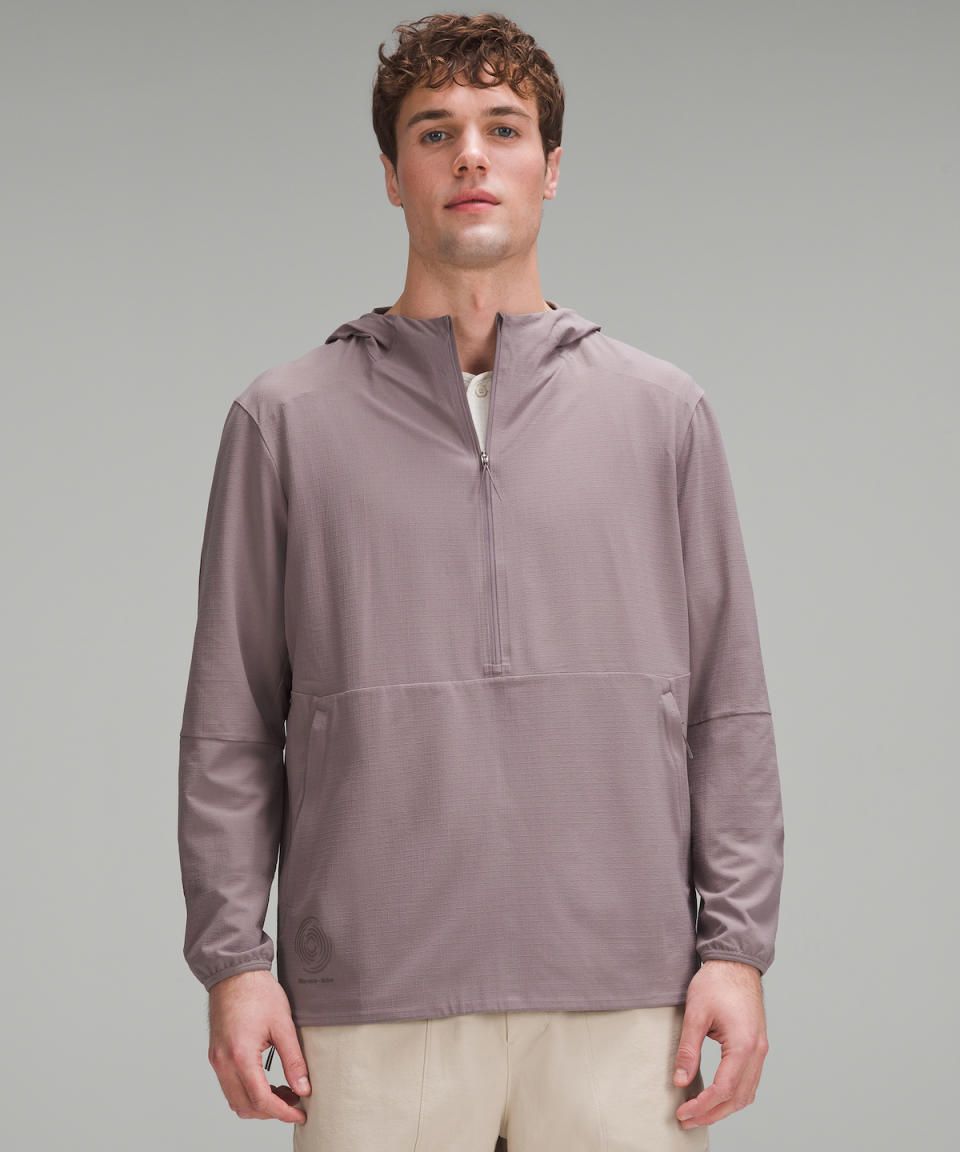Material World: Lululemon Uses Enzymes, Captured Carbon in New Jacket

Material World is a weekly roundup of innovations and ideas within the materials sector, covering news from emerging biomaterials and alternative leathers to sustainable substitutes and future-proof fibers.
Lululemon

Lululemon is launching the Packable Anorak: the brand’s first product made with enzymatically recycled polyester, created in partnership with Australian enviro-tech startup, Samsara Eco.
More from Sourcing Journal
The limited edition jacket features polyester made from a “combination of bioprocessing technologies,” including Samsara’s enzyme-based recycling and LanzaTech’s captured carbon emissions. Samsara’s technology employs patented enzymes to break down synthetic blends, while LanzaTech converts carbon emissions from industrial facilities into polyester building blocks. When combined, these technologies achieve a new way to produce polyester.
“Putting an end to fashion waste is critical to addressing the climate crisis. Our enzymatic recycling technology addresses the issue by putting waste to work, extracting fibers from old textiles and repurposing them for a next life,” Paul Riley, CEO and founder of Samsara Eco, said. “We’re proud to be working with Lululemon to create change and disrupt the linear economy of plastic. The Packable Anorak shows the potential to give clothes an infinite life and prevent textiles from ending up in landfills.”
The Packable Anorak uses various inputs—including mixed plastic waste, Lululemon’s own end-of-life stage apparel and converted carbon emissions—to achieve the company’s overarching vision of designing for circularity. The yoga pant purveyor’s ambition is to make 100 percent of its products with preferred materials and solutions by 2030.
“Our vision is to scale these technologies to address textile waste across our entire supply chain,” said Yogendra Dandapure, vice president, raw materials innovation at Lululemon. “This capsule product is a first step along this journey, helping us test and learn as we continue to advance circularity, which signals exciting possibilities for all industries looking to shift to more circular models.”
Nilit

Nilit has introduced Sensil Flow, a new approach to nylon 6.6 circularity. The sustainable performance product enables yarn, fabric and, ultimately, apparel recycling to eliminate waste and further reduce apparel’s environmental impact, the producer said in a statement.
“Our mission to create a more sustainable textile industry requires a shift in mindset throughout the value chain,” said Ilan Melamed, Nilit’s general manager. “Sensil Flow represents an out-of-the-box approach that directly enables yarn and fabric recycling and lays the groundwork for apparel recycling and is part of a broader circularity mission for Nilit.”
The Sensil Flow approach addresses recycling obstacles on “multiple fronts,” the company said, considering that it’s a yarn engineered to provide elasticity and recovery properties that can be considered as an alternative to elastane in certain end uses. The pure, premium nylon 6.6 yarns, fabrics and garments are “easily recycled” using a process that doesn’t require additional chemicals while also generating “minimal” carbon emissions. Nilit will also partner with recyclers to “facilitate the efficient recovery and recycling” of fabric waste and post-consumer fabrics. These partners are anticipated to create recycled nylon chips that Nilit can “reintroduce” into its fiber spinning process.
“According to industry experts, more than 90 million tons of apparel end up in landfills each year,” said Michelle Lea, Nilit’s chief marketing and sustainability officer. “Only about a fifth of discarded clothing is reused or recycled. The Sensil Flow approach eliminates waste throughout the production chain and enables brands to design apparel that lasts longer and, at the end of an extensive life, can be more easily recycled.”
Sparxell

Sparxell, a UK-based developer of sustainable and plant-based pigments, announced it has raised $3.2 million in various funding rounds.
This funding—raised from seed investments, grants and awards—will ramp up the development and commercialization of products without synthetic chemicals from colorants for markets including fashion and cosmetics.
Sparxell was founded in 2022 by Cambridge scientists who discovered a way to replicate vibrant hues found in nature using plant-based cellulose—a renewable, biodegradable resource extracted from waste streams. Sparxell’s pigments use the same material that plants and animals use, the company said, to produce its fade-resistant colorants. Thus, its products are toxin-free pigments that allegedly last longer than the incumbent options on the market.
“Traditional chemical colorants are causing major environmental harm through every stage of their lifecycle, from manufacture to degradation; over 10,000 fossil-based chemicals are used in current coloration processes,” Dr. Benjamin Droguet, Sparxell founder and CEO, said. “The textile industry is a well-known emitter of dyes and microplastics, with over 1.5 million tons entering the environment every year . . . our plant-based materials can be grown and sourcing locally in a complete rethink of how colors are currently being manufactured while reducing transport emissions.”
The Circular Innovation Fund, a global venture capital fund managed by clean-tech-focused capital managers Demeter and Cycle Capital, with L’Oréal as an anchor investor, participated in the seed funding round along with several other entities.
The company has already engaged several blue-chip brands in product innovation partnerships. It expects to launch a Series A funding round in the next few months to upscale production capacity and streamline commercialization.
Prada
Prada’s latest purse is made from recycled ocean plastic. The Re-Edition 1978 joins the Italian luxury house’s army of archival silhouettes rethought in Re-Nylon, the group’s regenerated nylon made from recycled ocean plastic.
The Re-Edition 1978 is a two-handle bag made of regenerated nylon and “enriched” with Saffiano leather details. One percent of proceeds from the purse and all other items in the Re-Nylon Collection support Sea Beyond, the educational program launched in 2019 by the Prada Group and UNESCO’s Intergovernmental Oceanographic Commission (IOC).
“Prada Re-Nylon represents an ideology, a distinct approach through multiple channels of communication that reaches beyond conventional fashion confines,” the group said in a statement. “It feeds into the ongoing mission of the Prada Group—to educate, to ignite new dialogue and inspire fresh discussion, with a focus on social responsibility.”
As part of its continued commitment to education and culture, Prada announced a media collaboration with National Geographic Creative Works.
“Exploring the ocean of the world, National Geographic Creative Works has expanded on the short film series debuted in 2019,” the group said. “That first step explained the how behind Prada Re-Nylon—the process of collecting waste of plastic from the ocean (like fishing nets) and from the landfills, as well as textile fiber waste—regenerated into Econyl, the starting point of an endless cycle of circularity.”
The second installation comprises three episodes in which the two groups explore the “why” behind Prada Re-Nylon, touching on the Indo-Pacific region of the Indian Ocean, the Arctic Ocean and the Mediterranean ecosystem.
“The latest expansion of the in-depth and long-standing storytelling collaboration between Prada and National Geographic Creative Works, these films highlight the vital role of ocean literacy—and how knowledge can help us tackle and even halt damage, to bring about lasting change,” Prada said.

